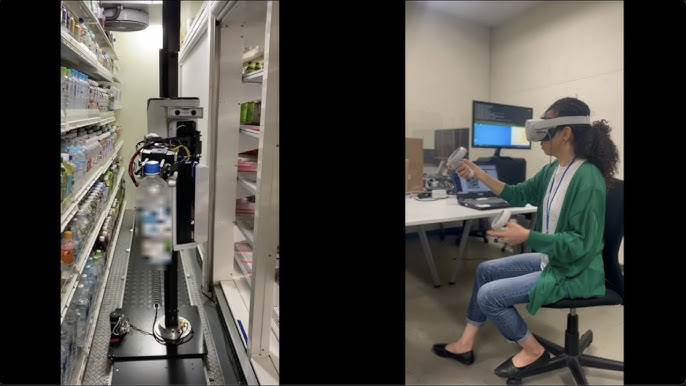🇯🇵 Japan Turns to VR Operators Abroad as Robots Restock Its Convenience Stores
In Japan, robots are now helping to restock the chilled shelves at FamilyMart and Lawson — but the people controlling them aren’t in Tokyo. They’re sitting 3,000 kilometres away in Manila.
A Tokyo start-up called Telexistence has rolled out its TX Ghost robots across more than 300 Japanese convenience stores. These machines handle most of the shelf-stacking on their own, but when something goes wrong — say, a drink topples over — human operators in the Philippines take over remotely using VR headsets and joystick controllers.
Telexistence to Install AI Restocking Robots in 300 Convenience Stores Across Japan
🤖 How It Works
The robots run on NVIDIA and Microsoft platforms and can perform the majority of tasks autonomously. When the system detects an issue — which happens around 4% of the time — a remote operator manually corrects it through a live VR interface.
The remote operation is handled by Astro Robotics, a Manila-based start-up employing engineering and computer science graduates. Each operator monitors up to 50 robots at once, stepping in about 50 times a day to fix errors.
Astro Robotics’ staff earn between £190 and £235 per month — roughly the same as a call-centre job — and some report VR motion sickness and fatigue from prolonged headset use. “We never know if we’ll still have work next week,” one operator told local media.
💼 The People Behind the Machines
According to Astro Robotics founder Juan Paolo Villonco, Japan’s severe labour shortage and high wages make it difficult to hire staff for physical shop-floor work. He says young, tech-savvy Filipinos are “perfectly placed” to handle these remote support roles.
Telexistence, meanwhile, isn’t stopping there. The company has started testing its robots in 7-Eleven stores since September 2025 and plans to launch a humanoid model named Astra by 2029, designed for wider retail and logistics use.
⚙️ Training the AI of the Future
Telexistence recently partnered with San Francisco-based Physical Intelligence to train new Vision-Language-Action (VLA) AI models. By analysing the data gathered from human VR operators, they hope to create robots that can learn from human behaviour and eventually work entirely autonomously.
But not everyone is optimistic. Researchers warn that this trend could deepen the global outsourcing divide — with developing countries providing low-cost “digital labour” to train the very systems that may later replace them.
A University of Michigan robotics professor, Lionel Robert, summed it up:
“Workers have become caretakers for the machines — standing in for them until they can stand on their own.”
📉 Japan’s Labour Crisis and Automation Push
Japan’s ageing population — with nearly one in three people over 65 — continues to shrink its working-age workforce. Studies suggest the country could face a labour shortfall of 3.4 million by 2030, growing to 11 million by 2040.
Convenience stores have been hit particularly hard. Staff spend up to two hours daily on repetitive restocking tasks — exactly the kind of routine labour robots can handle.
According to 7-Eleven’s operations chief Hiroki Takei, automation could cut employee workloads by up to 30%, freeing staff to focus on “new product creation and customer experience.”
🧠 Experts Split on Automation’s Future
The World Economic Forum estimates that purely human jobs will continue to decline as hybrid “human-machine” roles take over. Around 41% of companies surveyed expect to make staff redundant due to skill gaps.
Xian Guevarra, secretary-general of the Philippine Computer Engineers Association, criticised the imbalance:
“Filipino talent is being maximised by global firms — often to train systems that could replace them. Technology should empower people, not just boost profits overseas.”
Still, experts believe full automation remains distant. “Robots and AI won’t take every job,” said Robert. “Humans will remain essential in mixed human-machine workforces.”
Source: cnBeta

